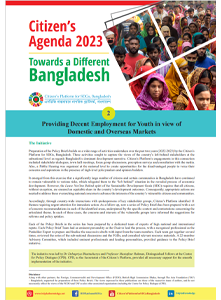 Background and Context
Background and Context
Bangladesh’s demographic landscape is characterised by a large young population, which offers both significant opportunities and confronts the country with formidable challenges. As is widely recognised, the country’s performance in terms of many socio-economic indicators has been quite impressive. However, cross-country experience shows that economic growth does not necessarily translate into more and better jobs, particularly for the poor, the disadvantaged, and those in danger of falling behind. This is what has been observed in the case of Bangladesh as well. Despite the country’s strong economic performance, concerns such as lack of enough job opportunities, particularly among the youth, access to limited number of decent jobs, and lack of skilled human resources have continued to remain persistent.
The above underpins the crucial need for focused initiatives to address the country’s emergent labour market challenges. The tasks are twofold: the economy must produce jobs for the increasing number of young people, and it has to ensure that labour market participants have the required skill sets that meet the demands of the workplace. In view of this, the Policy Brief draws attention to some of the critical attendant challenges and offers a number of concrete suggestions to address those. The areas cover high youth unemployment and underemployment, the nature of overseas employment, the presence of the dominant informal sector with a lack of decent jobs, low female labour force participation, widespread vulnerable employment, skills mismatch, and the challenges originating from the evolving landscape of the future of work. The Brief comes up with a number of concrete recommendations, keeping in perspective the needs of the young people belonging to the marginalised and disadvantaged communities. In dealing with the challenges, the Brief has drawn lessons from successful strategies and policies pursued by other countries. The recommendations encompass a holistic and actionable approach to reshaping Bangladesh’s labour market landscape, covering a wide range of areas: aligning education with labour market demands, embedding formal sector attributes to the informal sector, addressing overseas migration challenges, ensuring decent working conditions for labour market participants and attracting foreign direct investments (FDIs) and promoting entrepreneurship. The Brief recognises that needs of disadvantaged youth call for special attention, particularly if SDG-8, Decent Jobs, is to be attained by leaving no one behind. This Policy Brief can serve as a call to action, urging stakeholders to collaborate and align their efforts towards fostering a dynamic labour market capable of harnessing the demographic dividend that Bangladesh’s young population promises.
In order to deal with Bangladesh’s labour market challenges and address the requirements of providing decent work, with inclusivity and in a comprehensive manner, actions will need to be taken to deal with a number of areas of concern:
- High Youth Unemployment and Underemployment
- High Proportion of Youth ‘Not in Employment, Education, or Training (NEET)’
- Challenges facing Overseas Employment
- Dominant Informal Sector and Lack of Decent Jobs
- Low Female Labor Force Participation
- Prevalence of Vulnerable Employment
- Skills Mismatch and Behavioural Bias
- The Future of Work and Attendant Challenges
Published: May 2024


Leave A Comment